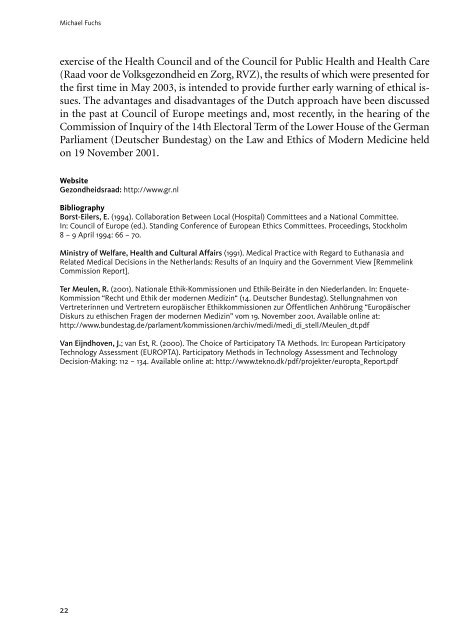Michael Fuchs National ethics councils - Deutscher Ethikrat
Michael Fuchs National ethics councils - Deutscher Ethikrat
Michael Fuchs National ethics councils - Deutscher Ethikrat
You also want an ePaper? Increase the reach of your titles
YUMPU automatically turns print PDFs into web optimized ePapers that Google loves.
<strong>Michael</strong> <strong>Fuchs</strong> <strong>National</strong> <strong>ethics</strong> <strong>councils</strong>. Their backgrounds, functions and modes of operation compared<br />
exercise of the Health Council and of the Council for Public Health and Health Care<br />
(Raad voor de Volksgezondheid en Zorg, RVZ), the results of which were presented for<br />
the first time in May 2003, is intended to provide further early warning of ethical issues.<br />
The advantages and disadvantages of the Dutch approach have been discussed<br />
in the past at Council of Europe meetings and, most recently, in the hearing of the<br />
Commission of Inquiry of the 14th Electoral Term of the Lower House of the German<br />
Parliament (<strong>Deutscher</strong> Bundestag) on the Law and Ethics of Modern Medicine held<br />
on 19 November 2001.<br />
Website<br />
Gezondheidsraad: http://www.gr.nl<br />
Bibliography<br />
Borst-Eilers, E. (1994). Collaboration Between Local (Hospital) Committees and a <strong>National</strong> Committee.<br />
In: Council of Europe (ed.). Standing Conference of European Ethics Committees. Proceedings, Stockholm<br />
8 – 9 April 1994: 66 – 70.<br />
Ministry of Welfare, Health and Cultural Affairs (1991). Medical Practice with Regard to Euthanasia and<br />
Related Medical Decisions in the Netherlands: Results of an Inquiry and the Government View [Remmelink<br />
Commission Report].<br />
Ter Meulen, R. (2001). <strong>National</strong>e Ethik-Kommissionen und Ethik-Beiräte in den Niederlanden. In: Enquete-<br />
Kommission “Recht und Ethik der modernen Medizin“ (14. <strong>Deutscher</strong> Bundestag). Stellungnahmen von<br />
Vertreterinnen und Vertretern europäischer Ethikkommissionen zur Öffentlichen Anhörung “Europäischer<br />
Diskurs zu ethischen Fragen der modernen Medizin” vom 19. November 2001. Available online at:<br />
http://www.bundestag.de/parlament/kommissionen/archiv/medi/medi_di_stell/Meulen_dt.pdf<br />
Van Eijndhoven, J.; van Est, R. (2000). The Choice of Participatory TA Methods. In: European Participatory<br />
Technology Assessment (EUROPTA). Participatory Methods in Technology Assessment and Technology<br />
Decision-Making: 112 – 134. Available online at: http://www.tekno.dk/pdf/projekter/europta_Report.pdf<br />
22<br />
2. Scandinavia and the British Isles<br />
Sweden<br />
The Swedish <strong>National</strong> Council on Medical Ethics (Statens Medicinsk-Etiska Råd,<br />
SMER) was established in 1985, and is thus one of the oldest bodies of its kind. It<br />
differs from equivalent institutions in other countries by the inclusion of a large<br />
number of politicians. Of its 19 members, seven represent the political parties in Parliament,<br />
while 12 experts are drawn from the fields of philosophy, the Church, the<br />
arts, law, organizations of the disabled, the Swedish Medical Association, the nurses’<br />
association and other groups.<br />
It is common in Swedish parliamentary life for expert commissions to be consulted<br />
in the legislative process. During the 1980s, commissions were appointed to<br />
consider ethical matters such as the criterion of brain death, genetic integrity, reproductive<br />
technologies and the rights of unborn children. The SMER has now been assigned<br />
the function of subjecting the proposals and drafts of the relevant expert<br />
commissions to ethical review as a part of the process of legislative preparation. This<br />
includes the expression of opinions by social groups and other interests. The role of<br />
the Council is considered to be to act as an interface between the world of science and<br />
the political decision-makers.<br />
The Swedish Council, too, was one of the first bodies of its kind in the world to<br />
have taken up the subject of priorities in healthcare. This issue was raised by the<br />
politician members of the Council. In the last two years, the principal motivations for<br />
its published Opinions have been the transposition of European directives into<br />
national law and the forthcoming ratification of Council of Europe protocols.<br />
Website<br />
SMER: http://www.smer.gov.se<br />
Bibliography<br />
Frank, M. (1994). The Role of the Parliamentarian in Ethics Committees. In: Council of Europe (ed.). Standing<br />
Conference of European Ethics Committees. Proceedings, Stockholm 8 – 9 April 1994: 37 – 39.<br />
Könberg, B. (1994). Introduction. In: Council of Europe (ed.). Standing Conference of European Ethics<br />
Committees. Proceedings, Stockholm 8 – 9 April 1994: 7 – 8.<br />
SMER (2002). Statement of Opinion on Embryonic Stem Cell Research (17.01.2002).<br />
Available online at: http://www.smer.gov.se/index.htm?lang=en&index=0&url=intro.html<br />
SMER (2002). Draft Additional Protocol to the Convention on Human Rights and Biomedicine, on Biomedical<br />
Research (25.03.2002).<br />
Available online at: http://www.smer.gov.se/index.htm?lang=en&index=0&url=intro.html<br />
23




